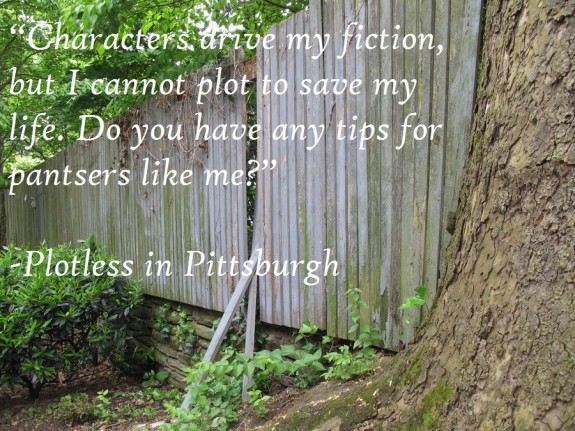Truth-time: I’m an incurable plotter. I like tracing the three-act or hero’s journey more than I like to do the actual writing.
So, to show my tolerance for “the other half,” I’m going to pants this blog.
That being said, I can appreciate a good character. Believe me, I’ve heard voices arguing in my head, trying to convince me not to [SPOILER ALERT] kill them off.
Characters who possess you and pour themselves out through your fingertips-to-keyboard sessions are great, but speaking from experience, they have the tendency to take the plot into their own hands and scheme to devise happy endings for themselves (it should come as no surprise that I prefer tragedies to comedies).
So, how do you plot tragic endings for your favorite little imaginary friends?
1. Write the End
I know, I know. “But I don’t know the end until I get there!” Well, stitch it on a flag and wave it proudly, but don’t ever use this as an excuse not to know what goals your characters are striving toward. Meandering excuses will only lead to a series that goes on forever with no foreseeable final installment in sight (I’m looking at you, George R.R.).
Write the end. It doesn’t have to be perfect. It doesn’t even have to be your real ending. Just get something down.
Now your characters have something to strive toward. They have to get from Point A to Point B. Let’s say they have to get across a wide, deep canyon in the end.
How do they get there? Let your characters decide. Each one is going to approach the obstacles differently. One might jump off the cliff, risk the rocks, and swim to the other side. Others might craft a crude bridge, or argue about how it should be built. Still others might bribe an Eagle to carry them across (eh hem . . . Tolkien).
Once you write to the end, you might find that your ending will change from what you’ve originally written. That’s okay. But at least now you will have a satisfying conclusion that your characters still helped to bring about.
2. Write the Story in Your Head First
This is the only time in your life someone might be giving you the chance—nay, the command—to daydream.
So, your Main Character is running around kickin’ @$$ and takin’ names? Let them. Just not in your novel.
This might involve some free writing. Let your mind wander and let your characters do how they do. They can go wild with this silly notion that they have wills of their own. As they wander, you might notice they stumble upon roadblocks, unsavory people, traps, and, you know, things they believe in enough to fight for.
Don’t freak out. This is called plot.
Use this to create strings of scenes for your novel. Your main character has helped you figure out what will happen; now put it together into a cohesive series of events and voila! You have just tricked yourself into creating a plot.
3. Don’t Plot at All
After all, you’re not ashamed of who you are. Go crazy. Pants that first draft. I’ll wait.
Done? Awesome. Now revise it.
This is tough to do, because it requires a fine, honest eye for weak spots in your work and the ability to so colloquially “kill your darlings.” You will need to trim those characters. Make them shape up. Give them a purpose and obstacles to overcome. Rewrite the beast.
Don’t worry, all ye plotters out there. My next column two weeks from now will be about how to let your story happen more organically instead of being an index-card control freak like me.
Are you a pantser or a plotter? How do you keep a hard rein on your characters so they don’t run away and have adventures without permission? I want to know!
Got a question? Tweet me @beccaquibbles with the hashtag #askbecca, email me at becca [at] DIYMFA [dot] com, or just leave a comment below! You could see your question answered right here!
———————————————–
 With a B.A. in B.S. (translation: English Major), Rebecca Ann Jordan is a speculative fiction author in San Diego. She has published short pieces in Fiction Vortex, Yemassee Magazine, Bravura Literary Journal, and more, and currently acts as Junior Assistant Editor at Bartleby Snopes. Her fetishes include controversial grammar, mythological happenings and yarn-swapping.
With a B.A. in B.S. (translation: English Major), Rebecca Ann Jordan is a speculative fiction author in San Diego. She has published short pieces in Fiction Vortex, Yemassee Magazine, Bravura Literary Journal, and more, and currently acts as Junior Assistant Editor at Bartleby Snopes. Her fetishes include controversial grammar, mythological happenings and yarn-swapping.







